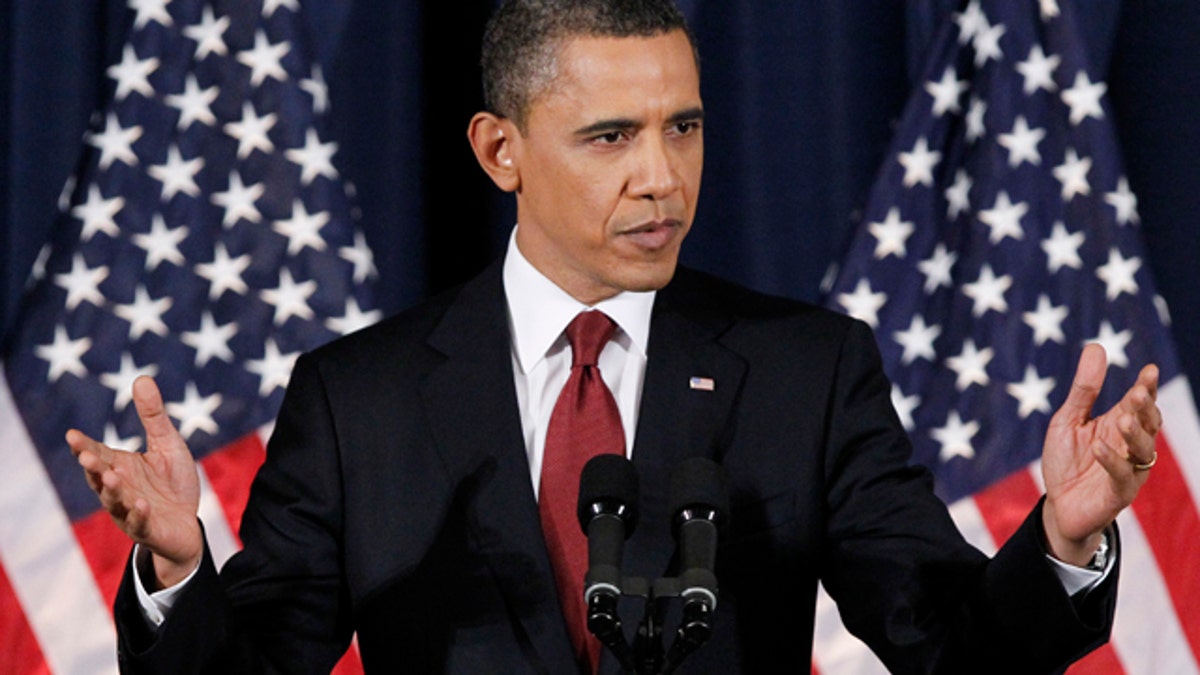
March 28, 2011: Obama says in a speech to the nation that the U.S. had 'a responsibility to act' in Libya.
As reports suggest world leaders are laying out options for Muammar al-Qaddafi to leave Libya quietly and quickly, President Obama said Tuesday in parallel broadcast TV interviews that it’s too early to start negotiating an exit for the dictator.
"Hopefully, he's going to be getting the message soon," the president said.
Obama pledged to increase diplomatic and political pressure on Qaddafi to get him to step down, but the president said Tuesday in an interview with ABC News that it’s “not going to happen overnight.”
"He's been greatly weakened. His forces have been degraded. But what's absolutely true is that if you measured his remaining capability to rebel or opposition capability then he's still more powerful on the ground in Libya,” Obama said.
In a separate interview with CBS Evening News, Obama said that Qaddafi’s inner circle is beginning to recognize that "their days are numbered." He said some may be negotiating to leave the regime. "But that information may not have filtered to Qaddafi yet," he said.
Scenarios for arming rebels -- who could then oust Qaddafi, thereby relieving the U.S. the responsibility of instituting "regime change" -- have been on the table since last week. But U.S. officials stressed Tuesday that no decision has been made, especially since the international community is still trying to figure out who the rebels are amid concerns that elements of Al Qaeda could be emerging.
Adm. James Stavridis said that intelligence has shown "flickers" of what could be Al Qaeda influence in opposition groups, but no detailed picture of the rebel organization has been formed yet.
Asked about the comment, Secretary of State Hillary Clinton said Tuesday that the Obama administration does not have specific information about individuals inside the rebel movement.
"We're still getting to know those who are leading the ... transitional national council," Clinton said during a meeting of top diplomats in London about the Libya crisis.
Susan Rice, the U.S. ambassador to the United Nations, said Tuesday it was too early to formally prop up the rebel groups.
"We have not taken any decision to formally recognize or embrace the opposition. It's too soon and we're still trying to get to know them," she told Fox News.
Even so, Obama did not rule out providing military hardware to rebels seeking to depose Qaddafi after nearly 42 years in power.
"One of the questions that we want to answer is: Do we start getting to a stage where Qaddafi’s forces are sufficiently degraded, where it may not be necessary to arm opposition groups," Obama said on NBC Nightly News.
In a speech to the nation Monday night, Obama said the military would not be used to pursue regime change, while making clear that he wants the people of Libya to oust Qaddafi themselves.
Of course, that ouster could use a little assistance in the way of international "pressure" consisting of carrots and sticks.
While the United States and its allies continue to launch missile strikes against the regime, the U.K.'s Guardian newspaper reported that the Italian government has offered to broker a deal under which the fighting would stop and Qaddafi would be allowed to go into exile in an unnamed African country.
"Qaddafi must understand that it would be an act of courage to say, 'I understand that I have to go'," Italian Foreign Minister Franco Frattini was quoted as saying. "We hope that the African Union can find a valid proposal."
The newspaper quoted a U.S. official who suggested Qaddafi could flee Libya to a country not subject to the International Criminal Court.
Some lawmakers have voiced confidence in the democratic intentions of those fighting Qaddafi's repressive regime. Sen. Joe Lieberman, I-Conn., repeatedly has called them "freedom fighters" whom the United States should support.
Sen. John McCain, R-Ariz., said on the Senate floor Tuesday that the leaders of the opposition consist of lawyers, students and human rights activists who genuinely want freedom.
But a 2008 article in Newsweek detailed how Al Qaeda, at the time, was recruiting suicide bombers in Libya -- in a town just three hours from the rebel stronghold of Benghazi. A key intelligence document at the time showed 19 percent of the suicide bombers in Iraq came from the town of Darnah in eastern Libya.
Pentagon officials acknowledged Monday there were "gaps in their knowledge" about the opposition groups.
White House Press Secretary Jay Carney, responding to these concerns, said Tuesday that the administration has spent "a lot of time" examining and meeting with opposition leaders.
"The folks who are in London ... have made clear what their principles are and we believe that they're meritorious, their principles," Carney said. "But that doesn't mean, obviously, that everyone who opposes Muammar Qaddafi ... is someone whose ideals we can support."
The Associated Press contributed to this report.












































